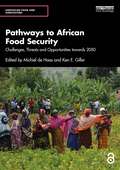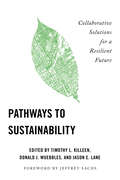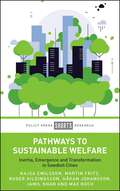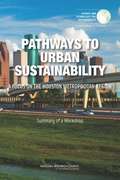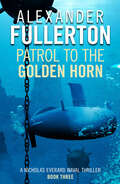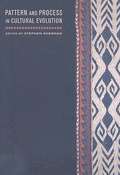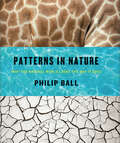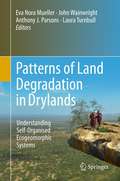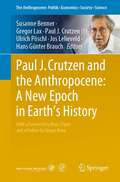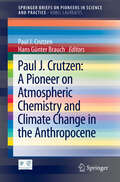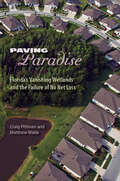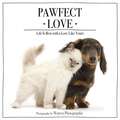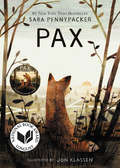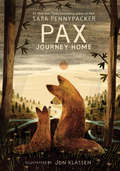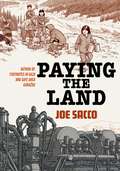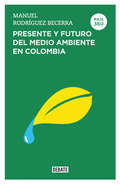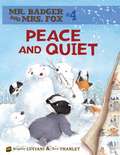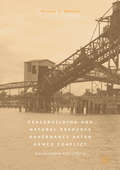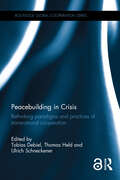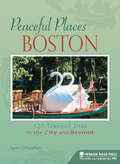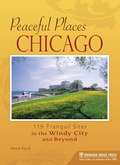- Table View
- List View
Pathways to African Food Security: Challenges, Threats and Opportunities towards 2050 (Earthscan Food and Agriculture)
by Ken E. Giller Michiel De HaasThis book examines Africa’s current food system and future challenges for food security over the next 25 years.Africa is on the rise and by 2050, the continent will be home to a quarter of the world’s population. The analysis presented in this book clearly shows that the African food system needs to transform at a much faster pace to ensure that the people it serves are food secure. This book begins with four contrasting case studies that focus on country-specific challenges in Egypt, Ethiopia, Senegal and Zimbabwe. This is followed by 15 thematic chapters organised in three sections on challenges, threats and opportunities. Individual chapters address a wide range of topics including climate change, water security, farm sizes, crop yields, conservation trade-offs, food prices, trade, conflict and structural change. The book concludes by discussing key pathways to improve Africa's food system and food security for the decades ahead.This book is essential reading for students, scholars and practitioners who work on global food security, sustainable food systems, food, health and nutrition and African development.
Pathways to Sustainability: Collaborative Solutions for a Resilient Future
by Timothy L. Killeen; Donald J. Wuebbles; Jason E. LaneIn an era defined by unprecedented environmental challenges and rapid societal change, how can we build a sustainable and resilient future? In this collection, the editors bring together groundbreaking insights and inspiring stories from around the globe, illuminating how innovative partnerships across sectors and borders are driving meaningful progress toward sustainability. Contributors from science, business, non-governmental organizations, and university leadership engage across their areas of expertise to discuss how to apply cutting-edge research toward understanding, mitigating, and adapting to today’s alarming environmental stresses. Throughout, the essayists showcase breakthroughs in sustainability science while providing a blueprint for creating collaborations, expanding networks, and connecting with new markets. Essential reading for sustainability leaders, educators, policymakers, and change-makers everywhere, this volume offers a visionary yet practical roadmap for harnessing the power of collaboration to advance practical solutions necessary to ensure a thriving planet for future generations. Expert and interdisciplinary, Pathways to Sustainability focuses on human capacity building and innovation to explore holistic solutions to climate change, unsustainable resource consumption, and other inevitable challenges of our time. Contributors: Nicole Arbour, Rebecca T. Barnes, Kyle Blount, Kayla Boparai, Caleb S. Brooks, Benjamin B. Campion, Christopher Castle, William L. Chadderton, Kenneth T. Christensen, Emily M. Clegg, Asher Cohen, Jonathan Coppess, Nathan L. Cummins, John D. Den Uyl, Miranda N. Domico, Francina Dominguez, Patrick J. Doran, Kelvin K. Droegemeier, Pengyue Du, Luis Gomez Echeverri, Brian Fath, John Ferry, Trent W. Ford, Regina Mae Francia, Georgie B. Geraghty, Janet Gooch, Timothy P. Grunloh, Kaiyu Guan, Luiz Gutierrez, Sam S. Haapaniemi, Julian Heiss, Barb Helland, Catherine Hurley, Atul K. Jain, Paul Kearns, Timothy L. Killeen, Rao Kotamarthi, Jason E. Lane, Wendy Larner, John T. Legge, L. Ruby Leung, Peiyuan Li, Leila Loupis, Josephine M. Malonza, Mark Manns, Lia Merminga, Maria J. Molina, David Muchangi Mugo, Meridith F. Muth, Selvaprabu Nadarajah, Cristina Negri, Pratik Patil, Andreas F. Prein, Ziqi Qin, Fany Ramos Quispe, Jonathan Radcliffe, Omer Rana, Dan Reed, Alyssa Rodway, Christine Rovelli, Elena Rovenskaya, Gabriella Pinheiro Servi, Gavin Shaddick, John Shalf, Ashish Sharma, Bjorn Stevens, Tih-Fen Ting, Dennis Todey, John Towns, Andrew J. Tucker, Albert van Jaarsveld, Carolina Veiga, Abhinav Wadhwa, Peter W. Wangai, Melissa Widhalm, Aaron B. Wilson, Molly Woloszyn, Sicheng Wu, Donald J. Wuebbles, and Joel Zavala
Pathways to Sustainable Welfare: Inertia, Emergence and Transformation in Swedish Cities
by Kajsa Emilsson Martin Fritz Roger Hildingsson Håkan Johansson Jamil Khan Max KochAvailable open access digitally under CC-BY-NC-ND licence. Pathways to Sustainable Welfare critically examines how cities can address the dual challenges of climate change and sustainability while ensuring the welfare of their populations. Focused on three Swedish cities, it explores the integration of environmental and welfare concerns in local policies, urban movements and public opinions. Based on theories of inertia, emergence and transformation, it identifies factors driving or obstructing sustainable welfare advancements. This book is a crucial resource for scholars interested in sustainable transformation, urban governance and social policy. It offers frameworks and empirical evidence relevant to academics, policy makers and practitioners seeking to understand and engage in urban sustainable welfare development.
Pathways to Urban Sustainability
by Dominic A. BroseThe workshop was convened to explore the region's approach to urban sustainability, with an emphasis on building the evidence base upon which new policies and programs might be developed. Participants examined how the interaction of various systems (natural and human systems; energy, water, and transportation systems) affected the region's social, economic, and environmental conditions. The objectives of the workshop were as follows: - Discuss ways that regional actors are approaching sustainability- specifically, how they are attempting to merge environmental, social, and economic objectives. - Share information about ongoing activities and strategic planning efforts, including lessons learned. - Examine the role that science, technology, and research can play in supporting efforts to make the region more sustainable. - Explore how federal agency efforts, particularly interagency partnerships, can complement or leverage the efforts of other key stakeholders. Pathways to Urban Sustainability: A Focus on the Houston Metropolitan Region: Summary of a Workshop was designed to explore the complex challenges facing sustainability efforts in the Houston metropolitan region and innovative approaches to addressing them, as well as performance measures to gauge success and opportunities to link knowledge with action. In developing the agenda, the planning committee chose topics that were timely and cut across the concerns of individual institutions, reflecting the interests of a variety of stakeholders. Panelists were encouraged to share their perspectives on a given topic; however, each panel was designed to provoke discussion that took advantage of the broad experience of the participants.
Pathways to Urban Sustainability: Summary of a Workshop
by Dominic A. BroseThe workshop was convened to explore the region's approach to urban sustainability, with an emphasis on building the evidence base upon which new policies and programs might be developed. Participants examined how the interaction of various systems (natural and human systems; energy, water, and transportation systems) affected the region's social, economic, and environmental conditions. The objectives of the workshop were as follows: - Discuss ways that regional actors are approaching sustainability- specifically, how they are attempting to merge environmental, social, and economic objectives. - Share information about ongoing activities and strategic planning efforts, including lessons learned. - Examine the role that science, technology, and research can play in supporting efforts to make the region more sustainable. - Explore how federal agency efforts, particularly interagency partnerships, can complement or leverage the efforts of other key stakeholders. Pathways to Urban Sustainability: A Focus on the Houston Metropolitan Region: Summary of a Workshop was designed to explore the complex challenges facing sustainability efforts in the Houston metropolitan region and innovative approaches to addressing them, as well as performance measures to gauge success and opportunities to link knowledge with action. In developing the agenda, the planning committee chose topics that were timely and cut across the concerns of individual institutions, reflecting the interests of a variety of stakeholders. Panelists were encouraged to share their perspectives on a given topic; however, each panel was designed to provoke discussion that took advantage of the broad experience of the participants.
Patrol to the Golden Horn (Nicholas Everard Naval Thrillers)
by Alexander FullertonNicholas Everard is ready to run the gauntlet in his most dangerous mission yet…The menacing bulk of the German battlecruiser Goeben lurks in the Golden Horn of Constantinople. It is vital that she is destroyed, and the plan is to send an E-class submarine in through the Dardanelles to sink her unawares.But it has been two years since an Allied submarine passed through the narrow straits successfully, littered as they are with minefields, nets and depth charges dropped by the gunboats endlessly patrolling above.To send a crew in now would be a death sentence, but sparing the Goeben is unthinkable. Enter Nick Everard.An unputdownable story of the final days of WWI, perfect for fans of Douglas Reeman and Patrick O’Brian.Praise for Alexander Fullerton‘The most meticulously researched war novels that I have ever read' Len Deighton
Patrones de la naturaleza (¡Arriba la Lectura!, Level Q #77)
by Pamela RushbyNIMAC-sourced textbook
Pattern and Process in Cultural Evolution
by Stephen ShennanThis volume offers an integrative approach to the application of evolutionary theory in studies of cultural transmission and social evolution and reveals the enormous range of ways in which Darwinian ideas can lead to productive empirical research, the touchstone of any worthwhile theoretical perspective. While many recent works on cultural evolution adopt a specific theoretical framework, such as dual inheritance theory or human behavioral ecology,Pattern and Process in Cultural Evolution emphasizes empirical analysis and includes authors who employ a range of backgrounds and methods to address aspects of culture from an evolutionary perspective. Editor Stephen Shennan has assembled archaeologists, evolutionary theorists, and ethnographers, whose essays cover a broad range of time periods, localities, cultural groups, and artifacts.
Patterns in Nature: Why the Natural World Looks the Way It Does
by Philip BallThe acclaimed science writer &“curates a visually striking, riotously colorful photographic display…of physical patterns in the natural world&” (Publishers Weekly, starred review). Though at first glance the natural world may appear overwhelming in its diversity and complexity, there are regularities running through it, from the hexagons of a honeycomb to the spirals of a seashell and the branching veins of a leaf. Revealing the order at the foundation of the seemingly chaotic natural world, Patterns in Nature explores not only the math and science but also the beauty and artistry behind nature&’s awe-inspiring designs. Unlike the patterns we create, natural patterns are formed spontaneously from the forces that act in the physical world. Very often the same types of pattern and form—such as spirals, stripes, branches, and fractals—recur in places that seem to have nothing in common, as when the markings of a zebra mimic the ripples in windblown sand. But many of these patterns can be described using the same mathematical and physical principles, giving a surprising unity to the kaleidoscope of the natural world. Richly illustrated with 250 color photographs and anchored by accessible and insightful chapters by esteemed science writer Philip Ball, Patterns in Nature reveals the organization at work in vast and ancient forests, powerful rivers, massing clouds, and coastlines carved out by the sea. By exploring similarities such as the branches of a tree and those of a river network, this spectacular visual tour conveys the wonder, beauty, and richness of natural pattern formation.
Patterns of Land Degradation in Drylands: Understanding Self-Organised Ecogeomorphic Systems
by John Wainwright Anthony J. Parsons Eva Nora Mueller Laura TurnbullThis book explores the theory of ecogeomorphic pattern-process linkages, using case studies from Europe, Africa, Australia and North America. Sets forth a research agenda for the emerging field of ecogeomorphology in drylands land-degradation studies.
Paul J. Crutzen and the Anthropocene: A New Epoch in Earth’s History (The Anthropocene: Politik—Economics—Society—Science #1)
by Hans Günter Brauch Paul J. Crutzen Susanne Benner Gregor Lax Ulrich Pöschl Jos LelieveldThis book outlines the development and perspectives of the Anthropocene concept by Paul J. Crutzen and his colleagues from its inception to its implications for the sciences, humanities, society and politics.The main text consists primarily of articles from peer-reviewed scientific journals and other scholarly sources. It comprises selected articles on the Anthropocene published by Paul J. Crutzen and a selection of related articles, mostly but not exclusively by colleagues with whom he collaborated closely.• In the year 2000 Nobel Laureate Paul J. Crutzen proposed the Anthropocene concept as a new epoch in Earth’s history • Comprehensive collection of articles on the Anthropocene by Paul J. Crutzen and his colleagues• Unique primary research literature and Crutzen’s comprehensive bibliography• Paul Crutzen’s scientific investigations into human influences on atmospheric chemistry and physics, the climate and the Earth system, leading to the conception of the Anthropocene• Reflections on the Anthropocene and its implications• Bibliometric review of the spread of the use of the Anthropocene concept in the Natural and Social Sciences, Humanities and Law
Paul J. Crutzen: A Pioneer on Atmospheric Chemistry and Climate Change in the Anthropocene (SpringerBriefs on Pioneers in Science and Practice #50)
by Hans Günter Brauch Paul J. CrutzenThis book contains texts by the Nobel laureate Paul J. Crutzen who is best known for his research on ozone depletion. It comprises Crutzen’s autobiography, several pictures documenting important stages of his life, and his most important scientific publications. The Dutch atmospheric chemist is one of the world’s most cited scientists in geosciences. His political engagement makes him a tireless ambassador for environmental issues such as climate change. He popularized the term ‘Anthropocene’ for the current geological era acknowledging the enduring influence of humankind on planet Earth. This concept conceives humans to be a geologic factor, influencing the evolution of our globe and the living beings populating it. The selection of texts is representing Paul Crutzen´s scientific oeuvre as his research interests span from ozone depletion to the climatic impacts of biomass burning, the consequences of a worldwide atomic war – the Nuclear Winter - to geoengineering and the Anthropocene.
Paving Paradise: Florida's Vanishing Wetlands and the Failure of No Net Loss (Florida History and Culture)
by Craig Pittman Matthew WaiteFlorida possesses more wetlands than any other state except Alaska, yet since 1990 more than 84,000 acres have been lost to development despite presidential pledges to protect them.How and why the state's wetlands are continuing to disappear is the subject of Paving Paradise. Journalists Craig Pittman and Matthew Waite spent nearly four years investigating the political expedience, corruption, and negligence on the part of federal and state agencies that led to a failure to enforce regulations on developers. They traveled throughout the state, interviewed hundreds of people, dug through thousands of documents, and analyzed satellite imagery to identify former wetlands that were now houses, stores, and parking lots.Exposing the unseen environmental consequences of rampant sprawl, Pittman and Waite explain how wetland protection creates the illusion of environmental protection while doing little to stem the tide of destruction.
Pawfect Love: Life Is Best with a Love Like Yours (Perfect for Animal Lovers)
by ZondervanPawfect Love combines adorable photos of unlikely animal pairs with affectionate quotes to share with the one you love--differences and all! With over 150 pages of fur-cuteness, grown-ups and kids will love this coffee table book. From a bunny snuggling with a duck to a kitty playing with a deer to a puppy having fun with a hamster, these furry pairs remind us that not being exactly the same is part of what makes a relationship great.Spotlighting topics such as commitment, happiness, and togetherness, the quotes are by an array of beloved writers, such as:C.S. LewisKatharine HepburnDonald MillerCharles DickensCharlotte BronteOscar Wildeand many more Delightful photos from the mother-son photography team Warren Photographic humorously communicate the lighter side of your heart's affection in this fun and unique gift book. Pawfect Love is a fun gift for:Couples on their engagement, wedding day, or anniversaryA significant other on Valentine's Day, a birthday, or any ordinary dayPeople who love animals and animal photography One of the best things about love is enjoying each other's uniqueness. Our animal friends have discovered this already! So here's to our differences! We wouldn't want it any other way--paws down.
Pax (Pax)
by Sara Pennypacker Jon Klassen<P>From bestselling and award-winning author Sara Pennypacker comes a beautifully wrought, utterly compelling novel about the powerful relationship between a boy and his fox. Pax is destined to become a classic, beloved for generations to come. <P>Pax and Peter have been inseparable ever since Peter rescued him as a kit. But one day, the unimaginable happens: Peter's dad enlists in the military and makes him return the fox to the wild. At his grandfather's house, three hundred miles away from home, Peter knows he isn't where he should be--with Pax. He strikes out on his own despite the encroaching war, spurred by love, loyalty, and grief, to be reunited with his fox . <P>Meanwhile Pax, steadfastly waiting for his boy, embarks on adventures and discoveries of his own. . . . <P><b>A New York Times Bestseller</b>
Pax, Journey Home (Pax)
by Sara PennypackerFrom bestselling and award-winning author Sara Pennypacker comes the long-awaited sequel to Pax; this is a gorgeously crafted, utterly compelling novel about chosen families and the healing power of love. <P><P> It’s been a year since Peter and his pet fox, Pax, have seen each other. Once inseparable, they now lead very different lives. <P><P> Pax and his mate, Bristle, have welcomed a litter of kits they must protect in a dangerous world. Meanwhile Peter—newly orphaned after the war, racked with guilt and loneliness—leaves his adopted home with Vola to join the Water Warriors, a group of people determined to heal the land from the scars of the war. <P><P> When one of Pax's kits falls desperately ill, he turns to the one human he knows he can trust. And no matter how hard Peter tries to harden his broken heart, love keeps finding a way in. Now both boy and fox find themselves on journeys toward home, healing—and each other, once again. <P><P> As he did for Pax, Jon Klassen, New York Times bestseller, Caldecott medalist, and two-time Caldecott Honoree, has created stunning jacket and interior illustrations. <P><P><b>A New York Times Best Seller</b>
Paying the Land
by Joe SaccoNAMED A BEST BOOK OF 2020 BY THE NEW YORK TIMES, THE GUARDIAN, THE BROOKLYN RAIL, THE GLOBE AND MAIL, POP MATTERS, COMICS BEAT, AND PUBLISHERS WEEKLYFrom the “heir to R. Crumb and Art Spiegelman” (Economist), a masterful work of comics journalism about indigenous North America, resource extraction, and our debt to the natural worldThe Dene have lived in the vast Mackenzie River Valley since time immemorial, by their account. To the Dene, the land owns them, not the other way around, and it is central to their livelihood and very way of being. But the subarctic Canadian Northwest Territories are home to valuable resources, including oil, gas, and diamonds. With mining came jobs and investment, but also road-building, pipelines, and toxic waste, which scarred the landscape, and alcohol, drugs, and debt, which deformed a way of life.In Paying the Land, Joe Sacco travels the frozen North to reveal a people in conflict over the costs and benefits of development. The mining boom is only the latest assault on indigenous culture: Sacco recounts the shattering impact of a residential school system that aimed to “remove the Indian from the child”; the destructive process that drove the Dene from the bush into settlements and turned them into wage laborers; the government land claims stacked against the Dene Nation; and their uphill efforts to revive a wounded culture.Against a vast and gorgeous landscape that dwarfs all human scale, Paying the Land lends an ear to trappers and chiefs, activists and priests, to tell a sweeping story about money, dependency, loss, and culture—recounted in stunning visual detail by one of the greatest cartoonists alive.
País 360. Presente y futuro del medioambiente en Colombia
by Manuel Rodríguez BecerraLa colección País 360 está compuesta por títulos de ensayo divulgativo que comprenden diversos aspectos de la realidad colombiana. Los más destacados investigadores y analistas presentan su mirada independiente sobre los temas que hoy definen nuestro país. Colombia es un país privilegiado por la naturaleza: con dos mares -cuya extensión es equivalente a su área continental-, una excepcional variedad de paisajes, ocupa el segundo lugar en diversidad de especies de flora y fauna y de ecosistemas del mundo, y el sexto en reservas de agua dulce. Sin embargo, esta riqueza se ha deteriorado en forma creciente en las últimas décadas y, además, está siendo afectada por la crisis ambiental mundial a la cual Colombia también ha contribuido. Manuel Rodríguez Becerra intenta responder con este libro a la demanda de información actualizada, clara y precisa de los lectores para comprender cuál es el presente y el futuro del medio ambiente en Colombia tomando en necesaria consideración el cambio climático, el declive de la biodiversidad y la contaminación que enfrenta nuestro planeta. Manuel Rodríguez Becerra es profesor emérito de la Universidad de los Andes, institución a la que se vinculó en 1971, y en donde ocupó los cargos de secretario general, vicerrector académico y decano de las facultades de Artes y Ciencias y Administración. Fue el primer ministro del Medio Ambiente de Colombia cuya creación coordinó. Hizo parte de la Comisión Mundial de Bosques y Desarrollo Sostenible y presidió el Panel Intergubernamental de Bosques de las Naciones Unidas. Su docencia e investigación se concentran en política ambiental, desarrollo sostenible y relaciones internacionales ambientales, las cuales lleva a cabo en la Facultad de Administración de la Universidad de los Andes. Cofundador de: el Foro Nacional Ambiental (1998) que hoy preside, Parques Naturales Nacionales Cómo Vamos (2017), el Centro de los Objetivos del Desarrollo Sostenible para América Latina y el Caribe (2018), y la Alianza para la Defensa de la Sabana de Bogotá (2019). Es autor de más de 25 libros y columnista de El Tiempo
Peace and Quiet (Fountas & Pinnell LLI Blue)
by Brigitte Luciani Eve Tharlet Carol BurrellCan this family keep the peace when they're cooped up together underground? <P><P> The days are getting colder. The badgers' bellies are getting rounder, and the foxes' fur is growing longer. That can only mean one thing: winter is coming! Ginger wants to sing and play and hunt in the snow. She wishes her badger brother, Grub, would join her, but he is busy taking daylong naps. She needs a perfect plan to make the whole family happy. But what do you do with a badger who only wants peace and quiet?
Peacebuilding and Natural Resource Governance After Armed Conflict: Sierra Leone and Liberia
by Michael D. BeeversThis book argues that a set of persuasive narratives about the links between natural resource, armed conflict and peacebuilding have strongly influenced the natural resource interventions pursued by international peacebuilders. The author shows how international peacebuilders active in Liberia and Sierra Leone pursued a collective strategy to transform “conflict resources” into “peace resources” vis-à-vis a policy agenda that promoted “securitization” and “marketization” of natural resources. However, the exclusive focus on securitization and marketization have been counterproductive for peacebuilding since these interventions render invisible issues connected to land ownership, environmental protection and sustainable livelihoods and mirror pre-war governing arrangements in which corruption, exclusion and exploitation took root. Natural resource governance and peacebuilding must go beyond narrow debates about securitization and marketization, and instead be a catalyst for trust–building and cooperation that has a local focus, and pursues an inclusive agenda that not only serves the cause of peace, but the cause of people.
Peacebuilding in Crisis: Rethinking Paradigms and Practices of Transnational Cooperation (Routledge Global Cooperation Series)
by Thomas Held Tobias Debiel Ulrich SchneckenerThe 1990s saw a constant increase in international peace missions, predominantly led by the United Nations, whose mandates were more and more extended to implement societal and political transformations in post-conflict societies. However, in many cases these missions did not meet the high expectations and did not acquire a sufficient legitimacy on the local level. Written by leading experts in the field, this edited volume brings together ‘liberal’ and ‘post-liberal’ approaches to peacebuilding. Besides challenging dominant peacebuilding paradigms, the book scrutinizes how far key concepts of post-liberal peacebuilding offer sound categories and new perspectives to reframe peacebuilding research. It thus moves beyond the ‘liberal’–‘post-liberal’ divide and systematically integrates further perspectives, paving the way for a new era in peacebuilding research which is theory-guided, but also substantiated in the empirical analysis of peacebuilding practices. This book will be essential reading for postgraduate students and scholar-practitioners working in the field of peacebuilding. By embedding the subject area into different research perspectives, the book will also be relevant for scholars who come from related backgrounds, such as democracy promotion, transitional justice, statebuilding, conflict and development research and international relations in general.
Peacebuilding in Crisis: Rethinking Paradigms and Practices of Transnational Cooperation (Routledge Global Cooperation Series)
by Thomas Held Tobias Debiel Ulrich SchneckenerThe 1990s saw a constant increase in international peace missions, predominantly led by the United Nations, whose mandates were more and more extended to implement societal and political transformations in post-conflict societies. However, in many cases these missions did not meet the high expectations and did not acquire a sufficient legitimacy on the local level. Written by leading experts in the field, this edited volume brings together ‘liberal’ and ‘post-liberal’ approaches to peacebuilding. Besides challenging dominant peacebuilding paradigms, the book scrutinizes how far key concepts of post-liberal peacebuilding offer sound categories and new perspectives to reframe peacebuilding research. It thus moves beyond the ‘liberal’–‘post-liberal’ divide and systematically integrates further perspectives, paving the way for a new era in peacebuilding research which is theory-guided, but also substantiated in the empirical analysis of peacebuilding practices.This book will be essential reading for postgraduate students and scholar-practitioners working in the field of peacebuilding. By embedding the subject area into different research perspectives, the book will also be relevant for scholars who come from related backgrounds, such as democracy promotion, transitional justice, statebuilding, conflict and development research and international relations in general.
Peaceful Places: Boston
by Lynn SchweikartThe fifth in a new series, each one set in a U.S. metropolis, Peaceful Places: Boston leads the reader on an unexpected path to secret delights shared by its insider author. This new title in an unusual guidebook series is for everyone who yearns for a little peace and quiet amidst the urban hubbub. The book entices readers with 120 tranquil oases, in Boston and beyond. There are enchanting walks, historic sites, museums and galleries, outdoor habitats, parks and gardens, quiet tables, spiritual enclaves, inspiring vistas, and urban surprises, all described from the perspective of a local who knows where to find serenity, in both familiar and unexpected places.
Peaceful Places: Chicago
by Anne FordThe fourth in a new series, each one set in a U.S. metropolis, Peaceful Places: Chicago leads the reader on an unexpected path. Author Anne Ford uncovers hidden pockets of relaxation throughout the windy city. Her unique guide reveals the surprising gardens, vistas, sanctuaries, café respites, and neighborhood strolls that make up Chicago communities from downtown to the 'burbs. Readers will discover new destinations, and they will find tips on when to visit grand and diminutive locales for a bit of quiet time.
